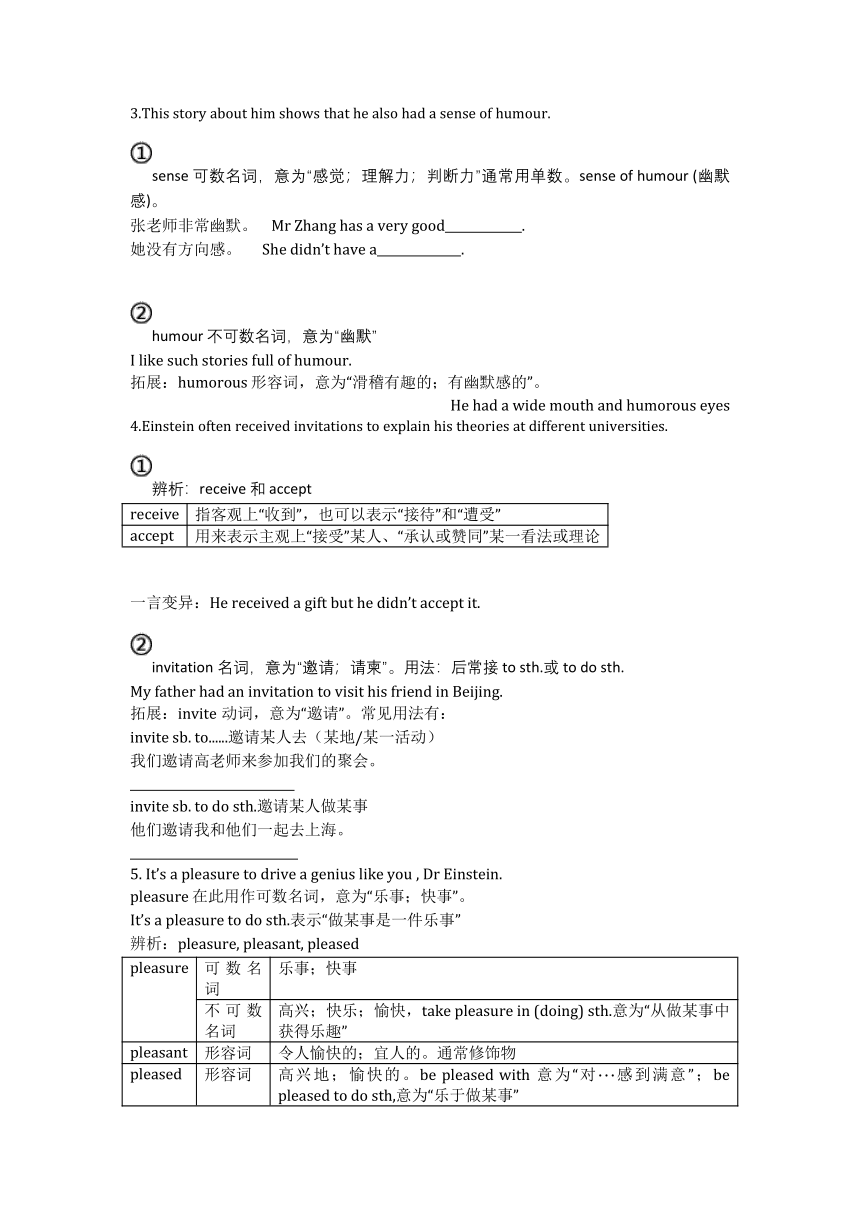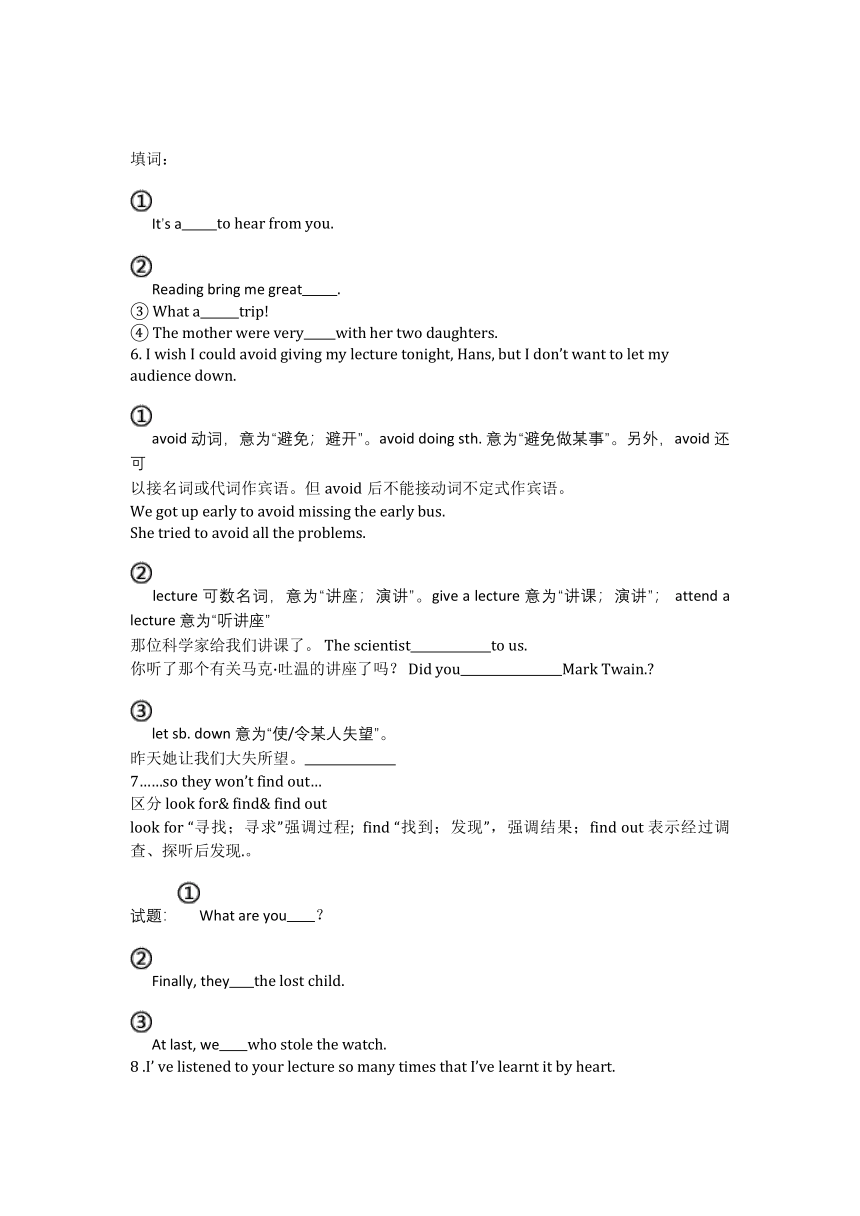Unit 2 Great minds 讲义2023-2024学年牛津深圳版(广州沈阳通用)九年级英语上册
文档属性
| 名称 | Unit 2 Great minds 讲义2023-2024学年牛津深圳版(广州沈阳通用)九年级英语上册 |

|
|
| 格式 | docx | ||
| 文件大小 | 31.5KB | ||
| 资源类型 | 教案 | ||
| 版本资源 | 牛津深圳版 | ||
| 科目 | 英语 | ||
| 更新时间 | 2023-08-21 10:13:35 | ||
图片预览



文档简介
Unit 2 Great minds
一:需背句子。
1.Genius is one percent inspiration and ninety-nine percent perspiration.
天才是百分之一的灵感加上百分之九十九的汗水
2.Great minds think alike. 英雄所见略同。
3.To / In order toimprove English, He thought of lots of good waysto studyEnglish .
4.If you don't work hard, you willlet your parents down.
5. It is very important for us to remember a lot of English vocabularies so you'd better learn themby heart.
7. As soon as the astronauts arrived the meeting room, we greeted them with warmapplause.
宇航员们一到会场,我们就以热烈的掌声欢迎他们。
7. Once youmake a decision/ make up your mind to do sth., stick to it and never give up.
一旦你下定决心做某事, 坚持下来,永不放弃。
二:难点全解
1.Listen to a radio programme about some great minds.听一些关于伟人的广播节目。
Mind在此用作可数名词,意为:聪明的,富有才智的人。
William Shakespeare was a great mind. 莎士比亚是一位伟人。
拓展:1)mind作名词,还可表示头脑,大脑,心思。
Make up one’s mind:下定决心 Change one’s mind:改变主意
2)mind可做动词,意为介意。 Mind+doing sth.
Do you mind me smoking here
2.Many people consider Albert Einstein a genius. ★★
consider及物动词,意为“认为;觉得”。consider sb./ sth.(as) sth.意为“认为某人/某物是···”。
英汉互译:
他认为自己是一个了不起的人。
They were considered as heroes.
另外,consider后还可接that从句。
He considered that we could do the work well.
拓展:consider 意为“考虑”,相当于think about, 其后可接名词、代词、动词-ing形式、从句
或“疑问词+不定式”作宾语。但其后不能接跟动词不定式作宾语。
例句:You’d better consider my suggestion.
We are consider going to Hainan next year. .
He has never considered how to solve the problem.
3.This story about him shows that he also had a sense of humour.
sense 可数名词,意为“感觉;理解力;判断力”通常用单数。sense of humour (幽默感)。
张老师非常幽默。 Mr Zhang has a very good .
她没有方向感。 She didn’t have a .
humour 不可数名词,意为“幽默”
I like such stories full of humour.
拓展:humorous 形容词,意为“滑稽有趣的;有幽默感的”。
He had a wide mouth and humorous eyes
4.Einstein often received invitations to explain his theories at different universities.
辨析:receive 和accept
receive 指客观上“收到”,也可以表示“接待”和“遭受”
accept 用来表示主观上“接受”某人、“承认或赞同”某一看法或理论
一言变异:He received a gift but he didn’t accept it.
invitation名词,意为“邀请;请柬”。用法:后常接to sth.或to do sth.
My father had an invitation to visit his friend in Beijing.
拓展:invite动词,意为“邀请”。常见用法有:
invite sb. to......邀请某人去(某地/某一活动)
我们邀请高老师来参加我们的聚会。
invite sb. to do sth.邀请某人做某事
他们邀请我和他们一起去上海。
5. It’s a pleasure to drive a genius like you , Dr Einstein.
pleasure 在此用作可数名词,意为“乐事;快事”。
It’s a pleasure to do sth.表示“做某事是一件乐事”
辨析:pleasure, pleasant, pleased
pleasure 可数名词 乐事;快事
不可数名词 高兴;快乐;愉快,take pleasure in (doing) sth.意为“从做某事中获得乐趣”
pleasant 形容词 令人愉快的;宜人的。通常修饰物
pleased 形容词 高兴地;愉快的。be pleased with意为“对···感到满意”;be pleased to do sth,意为“乐于做某事”
填词:
It’s a to hear from you.
Reading bring me great .
③ What a trip!
④ The mother were very with her two daughters.
6. I wish I could avoid giving my lecture tonight, Hans, but I don’t want to let my
audience down.
avoid 动词,意为“避免;避开”。avoid doing sth. 意为“避免做某事”。另外,avoid还可
以接名词或代词作宾语。但avoid后不能接动词不定式作宾语。
We got up early to avoid missing the early bus.
She tried to avoid all the problems.
lecture 可数名词,意为“讲座;演讲”。give a lecture 意为“讲课;演讲”; attend a lecture意为“听讲座”
那位科学家给我们讲课了。 The scientist to us.
你听了那个有关马克·吐温的讲座了吗? Did you Mark Twain.
let sb. down意为“使/令某人失望”。
昨天她让我们大失所望。
7……so they won’t find out…
区分 look for& find& find out
look for “寻找;寻求”强调过程; find “找到;发现”,强调结果;find out 表示经过调查、探听后发现.。
试题:What are you ?
Finally, they the lost child.
At last, we who stole the watch.
8 .I’ ve listened to your lecture so many times that I’ve learnt it by heart.
so adj\adv + that “如此...以至于”(用来修饰形容词或副词)
so many/few +复数可数名词+ that
我犯了如此多的错误,以至于我没能通过这次考试。
so much/little + 不可数名词+that
我有如此少的钱,以至于不能卖任何东西。
9.That’s such an easy question that even my driver can answer it.
such +a\an +adj +可数名词单数+that “如此...以至于”(用来修饰名词)
= so +adj+a\an +可数名词单数+that
他是如此聪明的一个男孩以至于每个人都喜欢他。
such +adj +复数可数名词+that
这些数学题如此难以至于我做不出来。
such +adj +不可数名词+that
这个工作如此艰巨以至于很少有人能按时完成。
10 . Now we’re in trouble.
(be) in trouble 意为“处于困境;倒霉”。
如果他不能按时完成工作,他就会倒霉了。
have trouble with...在···方面有麻烦/问题。
Maybe you will have trouble with your English, but never give up.
have trouble (in) doing sth. 作某事有困难
我读她的信有些困难。
11. Doctors warn people to avoid too much sun this summer
too much +不可数名词 太多。。。。 too much money
too many+不可数名词复数 太多。。。。。 too many books
much too +形容词 太。。。 she is much too llazy.
12 ……one of the cleverest womenin the world
one of the cleverest women意为“最聪明的女人之一”.
其结构为“one of+the+形容词最高级+可数名词复数”,表示“最……之一”。
Mozart is one of the most famous musicians in the world.
13. 四花费:spend&pay&take&cost
spend 主语通常是人 ①sb. spend...on sth. ②sb. spend...(in) doing sth 指花费时间或金钱
pay 主语通常是人 sb. pays for sth. 指人为某物支付金钱
take 主语通常是it It takes sb.some time to do sth. 指花费时间
cost 主语通常是物 sth. costs (sb.) some money 指花费金钱
My elder brother spends a lot of money on books every year.
How much did you pay for the food
It takes us an hour to practise playing basketball every day.
The skirt cost me 30 yuan.
14. I'll give you someadvice.
advice为不可数名词,意为“建议;意见”。常用表达:
a/one piece of advice 一条建议;some advice 一些建议
【拓展】①advice的常用搭配:
give sb. some advice/give some advice to sb. 给某人提一些建议
ask for advice 征求意见 follow/take one's advice 接受某人的建议
②advise动词,意为“建议”,后接名词、代词或动词-ing形式作宾语,也可用
于advise sb. (not) to do sth.结构,意为“建议某人(不要)做某事”。
She advised us to wait one more day. 她建议我们再等一天。
15. Why don't you... =Why not do... 通常用于征求意见、提建议,而不是表示疑问,意为“你(们)为什么不做……”
Why don't you ask the policeman =Why not ask the policeman
【拓展】英语中表示建议的常用句型还有:
①What/How about... ……怎么样 What/How about going fishing
②Would you like... 你想要……吗? Would you like something to drink
③Let's...! 让我们……吧! Let's play a game!
④You'd better... 你最好…… You'd better stay at home on such a hot day.
16.Can I leave message 我可以留言吗?
1)Can I/could I … 意为:我可以…. 吗?常有来表示征求对方的许可。
其肯定回答多用:Sure. Certainly./Of course, you can.等。
否定答语常用:Sorry, you can’t.
2)message意为可数名词,消息,音信。
Leave a message:留言 take a message:捎信,传话
Message 可数 信息,消息,音信 指从一个人传向另一个人的消息
Information 不可数 信息 指通过阅读,调查,学习等方法获得的或收到到的信息
News 不可数 消息,新闻 指报纸,电台或者电视等传播媒体向公众报道的消息
课后练习:
一.用所给单词的适当形式填空。
1.It’s a pleasure ( go ) for a walk with you.
2.He described his travel in South America in a ( humour ) way.
3.The lady refused his ( invite ) to the dinner party.
4.I ( listen ) to this piece of music many times.
5.It’s hard to avoid ( meet ) his as it is such a small village.
6.It’s my ( please ) to help you with the luggage.
7.Einstein took a seat, listened to Hans give his lecture without ( difficult ).
一:需背句子。
1.Genius is one percent inspiration and ninety-nine percent perspiration.
天才是百分之一的灵感加上百分之九十九的汗水
2.Great minds think alike. 英雄所见略同。
3.To / In order toimprove English, He thought of lots of good waysto studyEnglish .
4.If you don't work hard, you willlet your parents down.
5. It is very important for us to remember a lot of English vocabularies so you'd better learn themby heart.
7. As soon as the astronauts arrived the meeting room, we greeted them with warmapplause.
宇航员们一到会场,我们就以热烈的掌声欢迎他们。
7. Once youmake a decision/ make up your mind to do sth., stick to it and never give up.
一旦你下定决心做某事, 坚持下来,永不放弃。
二:难点全解
1.Listen to a radio programme about some great minds.听一些关于伟人的广播节目。
Mind在此用作可数名词,意为:聪明的,富有才智的人。
William Shakespeare was a great mind. 莎士比亚是一位伟人。
拓展:1)mind作名词,还可表示头脑,大脑,心思。
Make up one’s mind:下定决心 Change one’s mind:改变主意
2)mind可做动词,意为介意。 Mind+doing sth.
Do you mind me smoking here
2.Many people consider Albert Einstein a genius. ★★
consider及物动词,意为“认为;觉得”。consider sb./ sth.(as) sth.意为“认为某人/某物是···”。
英汉互译:
他认为自己是一个了不起的人。
They were considered as heroes.
另外,consider后还可接that从句。
He considered that we could do the work well.
拓展:consider 意为“考虑”,相当于think about, 其后可接名词、代词、动词-ing形式、从句
或“疑问词+不定式”作宾语。但其后不能接跟动词不定式作宾语。
例句:You’d better consider my suggestion.
We are consider going to Hainan next year. .
He has never considered how to solve the problem.
3.This story about him shows that he also had a sense of humour.
sense 可数名词,意为“感觉;理解力;判断力”通常用单数。sense of humour (幽默感)。
张老师非常幽默。 Mr Zhang has a very good .
她没有方向感。 She didn’t have a .
humour 不可数名词,意为“幽默”
I like such stories full of humour.
拓展:humorous 形容词,意为“滑稽有趣的;有幽默感的”。
He had a wide mouth and humorous eyes
4.Einstein often received invitations to explain his theories at different universities.
辨析:receive 和accept
receive 指客观上“收到”,也可以表示“接待”和“遭受”
accept 用来表示主观上“接受”某人、“承认或赞同”某一看法或理论
一言变异:He received a gift but he didn’t accept it.
invitation名词,意为“邀请;请柬”。用法:后常接to sth.或to do sth.
My father had an invitation to visit his friend in Beijing.
拓展:invite动词,意为“邀请”。常见用法有:
invite sb. to......邀请某人去(某地/某一活动)
我们邀请高老师来参加我们的聚会。
invite sb. to do sth.邀请某人做某事
他们邀请我和他们一起去上海。
5. It’s a pleasure to drive a genius like you , Dr Einstein.
pleasure 在此用作可数名词,意为“乐事;快事”。
It’s a pleasure to do sth.表示“做某事是一件乐事”
辨析:pleasure, pleasant, pleased
pleasure 可数名词 乐事;快事
不可数名词 高兴;快乐;愉快,take pleasure in (doing) sth.意为“从做某事中获得乐趣”
pleasant 形容词 令人愉快的;宜人的。通常修饰物
pleased 形容词 高兴地;愉快的。be pleased with意为“对···感到满意”;be pleased to do sth,意为“乐于做某事”
填词:
It’s a to hear from you.
Reading bring me great .
③ What a trip!
④ The mother were very with her two daughters.
6. I wish I could avoid giving my lecture tonight, Hans, but I don’t want to let my
audience down.
avoid 动词,意为“避免;避开”。avoid doing sth. 意为“避免做某事”。另外,avoid还可
以接名词或代词作宾语。但avoid后不能接动词不定式作宾语。
We got up early to avoid missing the early bus.
She tried to avoid all the problems.
lecture 可数名词,意为“讲座;演讲”。give a lecture 意为“讲课;演讲”; attend a lecture意为“听讲座”
那位科学家给我们讲课了。 The scientist to us.
你听了那个有关马克·吐温的讲座了吗? Did you Mark Twain.
let sb. down意为“使/令某人失望”。
昨天她让我们大失所望。
7……so they won’t find out…
区分 look for& find& find out
look for “寻找;寻求”强调过程; find “找到;发现”,强调结果;find out 表示经过调查、探听后发现.。
试题:What are you ?
Finally, they the lost child.
At last, we who stole the watch.
8 .I’ ve listened to your lecture so many times that I’ve learnt it by heart.
so adj\adv + that “如此...以至于”(用来修饰形容词或副词)
so many/few +复数可数名词+ that
我犯了如此多的错误,以至于我没能通过这次考试。
so much/little + 不可数名词+that
我有如此少的钱,以至于不能卖任何东西。
9.That’s such an easy question that even my driver can answer it.
such +a\an +adj +可数名词单数+that “如此...以至于”(用来修饰名词)
= so +adj+a\an +可数名词单数+that
他是如此聪明的一个男孩以至于每个人都喜欢他。
such +adj +复数可数名词+that
这些数学题如此难以至于我做不出来。
such +adj +不可数名词+that
这个工作如此艰巨以至于很少有人能按时完成。
10 . Now we’re in trouble.
(be) in trouble 意为“处于困境;倒霉”。
如果他不能按时完成工作,他就会倒霉了。
have trouble with...在···方面有麻烦/问题。
Maybe you will have trouble with your English, but never give up.
have trouble (in) doing sth. 作某事有困难
我读她的信有些困难。
11. Doctors warn people to avoid too much sun this summer
too much +不可数名词 太多。。。。 too much money
too many+不可数名词复数 太多。。。。。 too many books
much too +形容词 太。。。 she is much too llazy.
12 ……one of the cleverest womenin the world
one of the cleverest women意为“最聪明的女人之一”.
其结构为“one of+the+形容词最高级+可数名词复数”,表示“最……之一”。
Mozart is one of the most famous musicians in the world.
13. 四花费:spend&pay&take&cost
spend 主语通常是人 ①sb. spend...on sth. ②sb. spend...(in) doing sth 指花费时间或金钱
pay 主语通常是人 sb. pays for sth. 指人为某物支付金钱
take 主语通常是it It takes sb.some time to do sth. 指花费时间
cost 主语通常是物 sth. costs (sb.) some money 指花费金钱
My elder brother spends a lot of money on books every year.
How much did you pay for the food
It takes us an hour to practise playing basketball every day.
The skirt cost me 30 yuan.
14. I'll give you someadvice.
advice为不可数名词,意为“建议;意见”。常用表达:
a/one piece of advice 一条建议;some advice 一些建议
【拓展】①advice的常用搭配:
give sb. some advice/give some advice to sb. 给某人提一些建议
ask for advice 征求意见 follow/take one's advice 接受某人的建议
②advise动词,意为“建议”,后接名词、代词或动词-ing形式作宾语,也可用
于advise sb. (not) to do sth.结构,意为“建议某人(不要)做某事”。
She advised us to wait one more day. 她建议我们再等一天。
15. Why don't you... =Why not do... 通常用于征求意见、提建议,而不是表示疑问,意为“你(们)为什么不做……”
Why don't you ask the policeman =Why not ask the policeman
【拓展】英语中表示建议的常用句型还有:
①What/How about... ……怎么样 What/How about going fishing
②Would you like... 你想要……吗? Would you like something to drink
③Let's...! 让我们……吧! Let's play a game!
④You'd better... 你最好…… You'd better stay at home on such a hot day.
16.Can I leave message 我可以留言吗?
1)Can I/could I … 意为:我可以…. 吗?常有来表示征求对方的许可。
其肯定回答多用:Sure. Certainly./Of course, you can.等。
否定答语常用:Sorry, you can’t.
2)message意为可数名词,消息,音信。
Leave a message:留言 take a message:捎信,传话
Message 可数 信息,消息,音信 指从一个人传向另一个人的消息
Information 不可数 信息 指通过阅读,调查,学习等方法获得的或收到到的信息
News 不可数 消息,新闻 指报纸,电台或者电视等传播媒体向公众报道的消息
课后练习:
一.用所给单词的适当形式填空。
1.It’s a pleasure ( go ) for a walk with you.
2.He described his travel in South America in a ( humour ) way.
3.The lady refused his ( invite ) to the dinner party.
4.I ( listen ) to this piece of music many times.
5.It’s hard to avoid ( meet ) his as it is such a small village.
6.It’s my ( please ) to help you with the luggage.
7.Einstein took a seat, listened to Hans give his lecture without ( difficult ).
